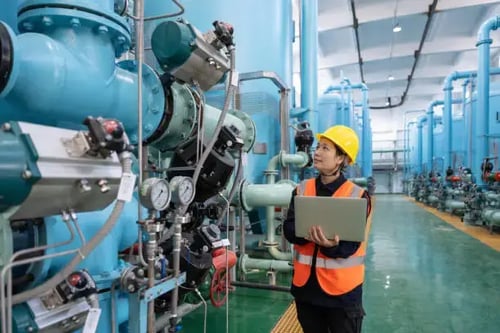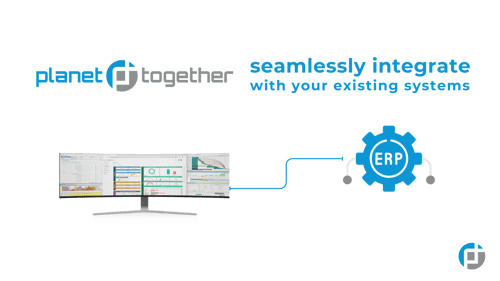Topics: Real-time Visibility, PlanetTogether Software, Reduced Lead Times, Integrating PlanetTogether, Better Resource Allocation, Chemical Manufacturing, What-if Scenario Planning, Higher Scheduling Accuracy, Stringent Quality and Safety Standards

In the high-stakes environment of chemical manufacturing, where product quality, safety, and regulatory compliance are non-negotiable, Production Schedulers face the dual challenge of coordinating complex processes while ensuring optimal resource utilization. Effective process management and optimization are critical for maintaining throughput, minimizing downtime, and meeting tight delivery deadlines. As product portfolios expand and customer expectations evolve, traditional scheduling methods often fall short.
This is where modern Advanced Planning and Scheduling (APS) systems like PlanetTogether, integrated with ERP platforms such as SAP, Oracle, Microsoft Dynamics, Kinaxis, or Aveva, come into play. For Production Schedulers, this integration is a game-changer—enabling real-time visibility, data-driven decision-making, and continuous process improvement.
Chemical production environments are among the most complex in manufacturing, primarily due to:
Batch processing dependencies
Hazardous material handling
Stringent quality and safety standards
Multi-product lines with shared resources
Unpredictable demand and supply variability
Schedulers must carefully balance tank capacities, cleaning schedules, heating/cooling time constraints, and regulatory compliance timelines. Manual planning tools like spreadsheets or siloed legacy systems are inadequate in the face of these complexities.

Process management in chemical manufacturing goes beyond simply orchestrating production tasks. It involves:
Mapping out the most efficient sequence of operations
Allocating resources (equipment, labor, materials) optimally
Monitoring in-process performance metrics
Minimizing changeover and cleaning times
Ensuring traceability and compliance
Without robust process management, inefficiencies like excessive downtime, inventory overstocking, or production bottlenecks can quickly erode margins and impact customer satisfaction.
Production Schedulers are under constant pressure to optimize operations. This involves finding the best balance between production speed, cost, and quality, often in real time. Optimization translates to:
Reduced lead times
Fewer production delays
Lower energy consumption
Improved on-time delivery rates
Enhanced yield and material utilization
To achieve this, schedulers need tools that can not only visualize production plans but also simulate multiple scenarios and recommend the best possible outcomes.

PlanetTogether’s APS software provides Production Schedulers with a centralized platform to model, plan, and optimize every aspect of chemical production. When integrated with enterprise systems like SAP, Oracle, Microsoft Dynamics, Kinaxis, or Aveva, it allows for real-time synchronization of production and business data, eliminating blind spots and manual updates.
Key capabilities include:
Finite capacity scheduling to avoid overbooking equipment or labor
What-if scenario planning for proactive disruption management
Real-time visibility into equipment status and material availability
Gantt chart visualization for easy timeline management
KPI tracking and reporting to support continuous improvement
By connecting with ERP platforms, PlanetTogether can automatically pull demand forecasts, work orders, material availability, and shift schedules—ensuring schedulers are always working with the latest data.
By unifying PlanetTogether with platforms like Oracle or Aveva, Production Schedulers gain:
Reduced manual effort through automation of schedule updates
Higher scheduling accuracy based on real-time data synchronization
Improved communication across departments (procurement, quality, logistics)
Greater agility in responding to unplanned events
Better resource allocation for labor, utilities, and equipment
Schedulers are empowered to make smarter, faster decisions without relying on guesswork or outdated information.

In the chemical sector, lean manufacturing principles must coexist with stringent regulatory compliance. Integrated planning tools support both by:
Reducing waste through better batch size planning
Minimizing inventory with just-in-time raw material scheduling
Improving documentation for audits and traceability
Enhancing safety protocols by aligning production with safety data sheets (SDS)
PlanetTogether’s role in this ecosystem is to ensure the production schedule aligns seamlessly with compliance mandates and lean objectives.
In a digital manufacturing environment, Production Schedulers are no longer just planners—they’re strategic orchestrators of operational excellence. With tools like PlanetTogether integrated with SAP, Oracle, Microsoft Dynamics, Kinaxis, or Aveva, schedulers can transform chemical production from reactive to proactive, from rigid to agile.
The result?
Increased throughput
Lower operational costs
Higher customer satisfaction
Better compliance and safety adherence
For chemical manufacturers aiming to thrive in today’s dynamic markets, optimizing process management through integrated APS systems is no longer optional—it’s essential.
Are you ready to take your manufacturing operations to the next level? Contact us today to learn more about how PlanetTogether can help you achieve your goals and drive success in your industry.
Topics: Real-time Visibility, PlanetTogether Software, Reduced Lead Times, Integrating PlanetTogether, Better Resource Allocation, Chemical Manufacturing, What-if Scenario Planning, Higher Scheduling Accuracy, Stringent Quality and Safety Standards
0 Comments







LEAVE A COMMENT